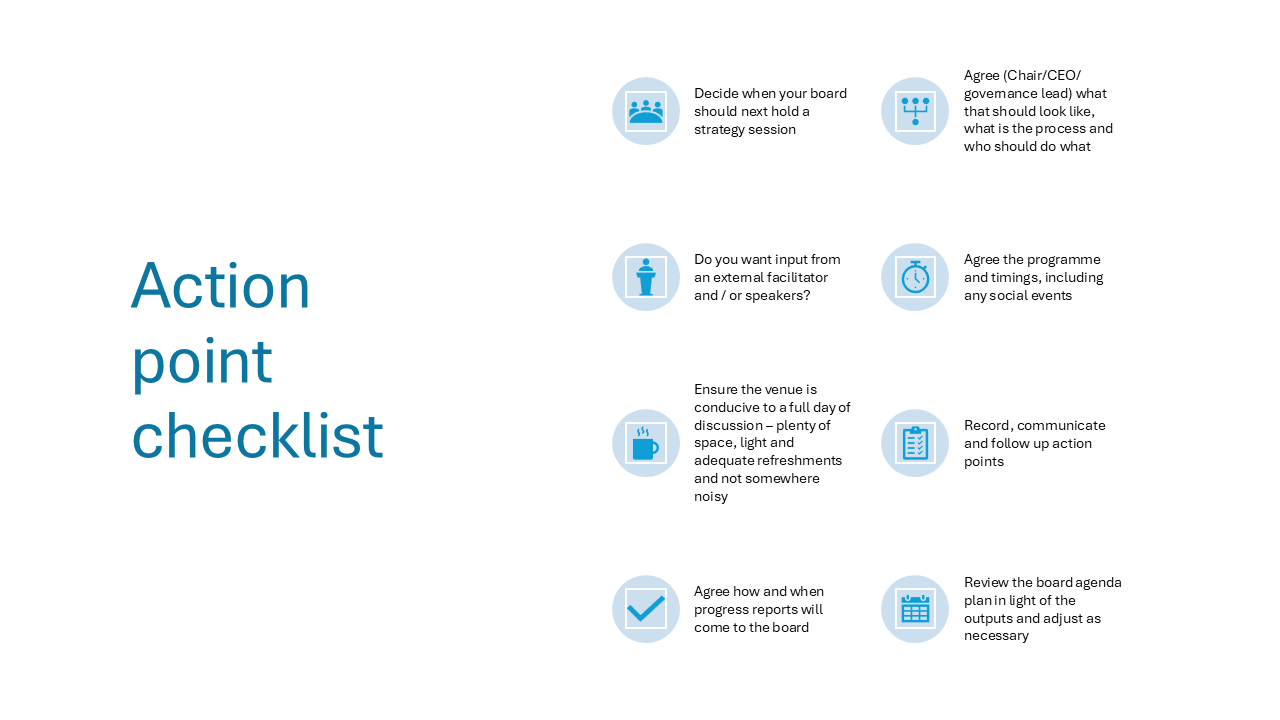How to keep your board on track

The first of my five reflections for your board this year was “Is the board spending its time on the key issues?” So how does the board stay focussed on what it should be doing? The first point to consider is the board’s involvement in strategic planning as this will overarch everything else and can help avoid directors becoming distracted with operational detail.
How do you deal with strategy now?

Many boards have an annual strategy day to consider where the company is heading. Sometimes this is a fundamental review, with initial “blue sky” thinking followed by the development of a new strategic plan. Other times, the board reviews progress against the current plan and maybe tweaks it here and there to take account of recent and upcoming changes. Occasionally life (corporate activity, tough trading, unexpected developments) can mean that the normal board agenda is interrupted. If that was the case for you in 2024, then the start of a new year is a perfect opportunity to get back on track.
So who leads on strategy – and who should do? Often the executive team (directors and other senior managers) will have their own session to develop the strategy and then spend a lot of time preparing informative presentations which they “pitch” to the board. The NEDs acknowledge that this is a valuable opportunity to assess the executive team and see how well they are doing. Are there any rising stars where some carefully targeted talent management could result in them joining the board one day? However, it can also mean that the board is presented with a fully baked plan which it is asked to endorse. This then misses out on the opportunity for the whole board to contribute and for the executive team to benefit from the knowledge and experience which the NEDs bring.
How could you do things differently?

There are a number of ways to change the process and get the best from it. For example, going offsite rather than being in the organisation’s own office can prevent interruptions and distractions. Using an external facilitator for the whole day or outside speakers for certain sessions will provide fresh persepctives. Ground rules, such as only looking at phones in the breaks can ensure better concentration on the task in hand.
The programme might benefit from the following:
- Dedicated time for horizon scanning for risks and opportunities eg geopolitical developments, macroeconomic trends, technological advances, climate change, the evolution of the competitive landscape and so on
- Preparing open questions and allowing plenty of time for discussion – don’t pack the day with presentations. The NEDs may actually get a better idea about emerging talent from a discussion than a well rehearsed presentation
- Encouraging constructive challenge and debate
- Having conversations in smaller groups if the board and exec team together is quite large.
- Holding a board/exec team dinner for some pre or post strategy day discussion or to explore a particular topic in a more relaxed environment.
At the end of the day, check that you have set appropriate milestones and KPIs – both financial and non financial and decide when you will hold a follow up session and what you aim to achieve by then.
Conclusion
If you decide you want to do things differently in 2025 then the checklist below should get you started.


